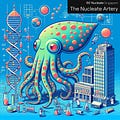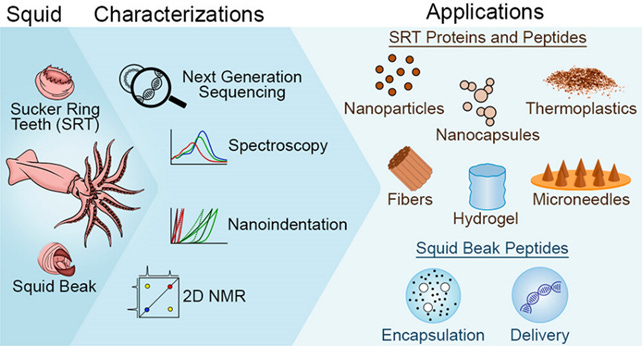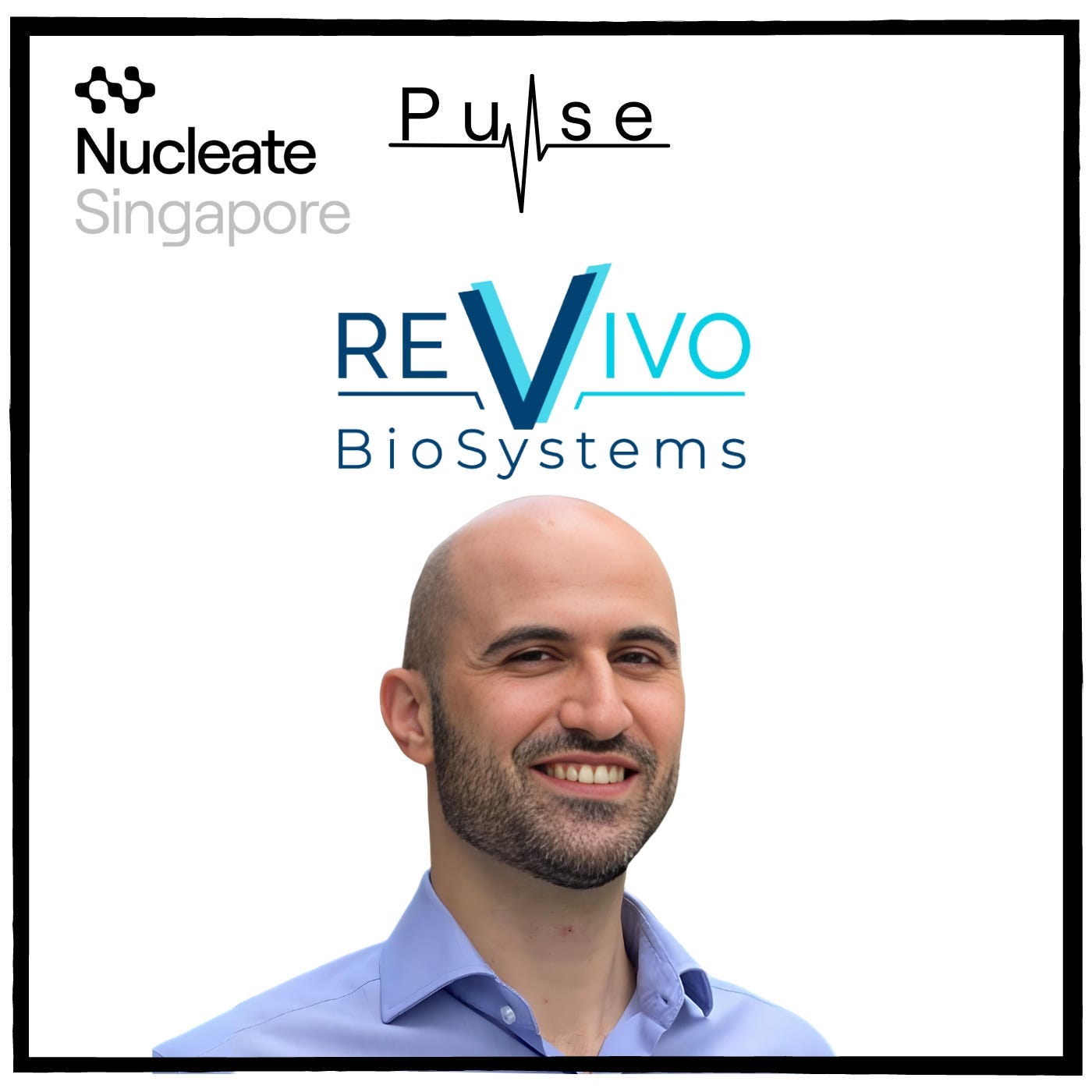The Nucleate Artery: How squids contribute to cancer research, and what the young can keep in mind on their biotech journey
We are The Nucleate Artery, a monthly newsletter focused on the latest Singaporean biotech research and events. Chat with us via our Slack community: @Liyana Ayub Ow Yong @Leong Kim Whye @Yeow Jiang @Ignacius Tay.
If you enjoyed reading this post, leave a comment and give us a like!
Two months into 2024 and we’re seeing so much good biotech coming out of our local research scene! We want to make sure we cover the entire breadth of innovative biotech developments, tell us if you want us to write about your research, or if there are specific areas of research you think deserves a spotlight.
In the meantime…enjoy our picks of the month!
🍽️ Digestibles
(Research that has been published within the past 2 months)
DRUG DEVELOPMENT: Staple-ing success with these few steps!
Protein-based therapeutics offer a valuable advantage by selectively disrupting specific protein interactions and transcription factors, complementing small molecules in drug development. However, proteins/peptides tend to naturally break down or lose shape in cells, reducing their effectiveness. Just like how we use staples to keep our stack of papers organised, molecularly stapling peptides involves locking them into a specific shape (typically helical structure similar to DNA); enhancing their stability and giving them extra advantages such as better binding and improved cell entry. But making sure the stapled peptide gets inside the cells where it is needed without causing unintended side effects is a challenging task. Starting with ATSP-7041, a stapled peptide previously synthesised by Aileron Therapeutics to target aberrant p53-Mdm2/X protein-protein interaction associated with cancers, Chandramohan et al. highlighted a set of design principles to generate even safer and more effective analogs of ATSP-7041. Their optimization resulted in a lead peptide with the ability to stop uncontrolled cell growth while being devoid of off-target effects, potentially marking a significant breakthrough in the challenging and arduous journey to developing stapled peptides as cancer therapeutics.
Fixated with stapled peptides?
Stay informed with Derek Lowe's decade-long, in-depth coverage of stapled peptides.
Follow FogPharma, co-founded by Aileron co-founder Greg Verdine and p53 pioneer David Lane, and their recent Phase I/II clinical trial of FOG-001 in advanced solid tumours.
Recently at JPM2024, FogPharma’s new CEO Mathai Mammen unveiled a 'contrarian' plan in oncology. Learn more about the new CEO through his interview here.
CANCER DIAGNOSTICS: miRNA Unveils Distinctions!
Distinguishing T-cell lymphoma affecting lymph nodes from reactive lymph node conditions remains a clinical challenge. Over the past decade, microRNAs (miRNAs) have emerged as promising diagnostic biomarkers in cancer due to their regulatory role in gene expression. In this recent study by Muhammad, Eng and et al., miRNA expression signatures were explored as supporting tests for nodal T-cell lymphomas, focusing on prevalent subtypes: nodal T-follicular helper cell lymphomas (nTFHL) and peripheral T-cell lymphomas (nPTCL), that constitute 70% of T-cell lymphomas involving lymph nodes. The study successfully identified miRNA patterns that distinguished nodal T-cell lymphomas from reactive lymph node conditions, presenting a valuable tool that reduces the likelihood of misdiagnosis.
Mighty insights in a micro(RNA) package:
Mirxes was granted the FDA's Breakthrough Device Designation for GASTROClearTM, an innovative blood-based cancer detection test aimed at advancing early cancer detection of gastric (stomach) cancer.
This concurrent study explored a multi-modal spectroscopy approach to analyse miRNA in blood serum of breast cancer patients, presenting a quicker alternative to PCR for precisely distinguishing between malignant and benign tumours.
Hummingbird Diagnostics is expanding the application of blood-based miRNA diagnostics, moving beyond cancer detection to explore early diagnosis of Alzheimer’s and Parkinson’s.
BIOMATERIALS AND DRUG DELIVERY: Squid serendipity: Unravelling the squid’s blueprint for advanced drug delivery.
Reprinted with permission from Sun, Y., Hiew, S. H., & Miserez, A. (2023). Bioinspired Squid Peptides─ A Tale of Curiosity-Driven Research Leading to Unforeseen Biomedical Applications. Accounts of Chemical Research, 57(1), 164-174. Copyright 2023, American Chemical Society.
Unlike most rigid biological structures, the hard bits of a squid derive their hardness purely from protein-sugar composites, instead of the more complex biominerals. Its simplicity can expand the building blocks for applied biomaterial research and has inspired many scientists to attempt to replicate the rigid mechanical properties of these squid peptides. In one such attempt, Sun et al., discovered that at the molecular level, these peptides consist of short repeats that can be modified, allowing the mechanical properties of this biomaterial to be regulated and even respond to pH and temperature changes. These modular and pliable characteristics permits the self-assembly of the peptides into hydrogels that can encapsulate large macromolecules to form cell-permeable peptide microdroplets - a first-of-its-kind, overcoming a persistent hurdle for cell targeted-delivery of a large range of macromolecular substrates. These developments present exciting prospects in cancer- and gene-therapy.
Exciting developments:
Patents related to this study have been filed. The first patent describes the preparation of squid peptides into microdroplets for drug encapsulation. The second patent describes the drug delivery process where squid peptides-derived microdroplets permeate and disintegrate inside mammalian cells to release the cargo.
Other research we found:
Discover the importance of examining RNA structure, rather than its sequence alone, in identifying biomarkers related to development and disease.
Distinct changes in plasma sphingolipid patterns can potentially be useful as biomarkers and therapeutic targets in Alzheimer's disease and vascular dementia.
Exploring innovative therapeutic approaches in cancer treatment: Gas Therapy and In Situ Mitochondrial Biomineralization.
🥡 Event Takeaways
(Exclusive insights from biotech events in SG)
Takeaways from the Global Young Scientists Summit (GYSS): Anticipating translational solutions in academic research
In January, our very own Director of Communications Isha Karnik presented a poster at this year’s Global Young Scientists Summit [1].
P.S. she works on developing humanised mouse models for soft tissue sarcoma like leiomyosarcoma and liposarcoma, to study its underlying mechanisms and develop novel therapeutics; ask her about it by sending her a DM in our Slack community 💬
Amongst the attendees at GYSS are Nobel Laureates who partook in the incredible scientific and nonscientific conversation with stellar young scientists. Discussions included what the most recent scientific and technological advances are, and how these influence society. Of the many important conversations being held, the “Innovation and Entrepreneurship in Science'' panel brought up points most relevant to Nucleate Singapore’s mission of supporting our local biotech ecosystem.
A mindset towards translational research can complement academic research
As conversations progressed, we saw a trend in the questions being put forth, “How does one go about translating their research?”. It stood out to us how much early career scientists among the crowd have considered entrepreneurship and translational research as means to increase the reach of their research. There was a strong sense of hope to translate their research findings into technology that could possibly impact society in meaningful ways. By doing so, it could also increase and diversify the opportunities open to them. Indeed, there seemed to be the general sentiment that it is necessary to not only envision the translational potential of our research, but also to have the capabilities to collaborate and bring this potential into the market so that we remain competitive in either academia and industry. Projects that are generally considered more fundable tend to have a “potential significant impact to industry and society” [2]. Thus, as the tide moves towards such funding opportunities, academics are learning to position their research in a way that responds to these national interests. Being able to anticipate how a research question can become a translational solution has become a skill that everyone needs to cultivate.
Read more:
Ministry of Foreign Affairs’ Healthcare R&D Overview and Current Strategy 2022
National Research Foundation’s (NRF) Corporate Labs and Translational Platforms
NRF’s List of Awarded Competitive Research Programme (CRP) Projects
Prime for translation and collaboration across disciplines
For those of us who want to move into the sphere of entrepreneurship, we see the need to take all opportunities to upskill early, to acquaint ourselves with the vocabulary used, the processes that take place, and most importantly to the world of networking. This is especially relevant in current times where technologies that accelerate what was previously pain-staking and time-consuming in our search for answers are now readily available (think DNA sequencing and AI-driven analyses). As technology advances, opportunities to innovate and creatively transform research presents itself more abundantly - but this cannot be done in isolation. Interdisciplinary collaborations become paramount to transform and bring to life such ideas.
We know how difficult it is to find avenues to up-skill and connect, here at Nucleate we have prepared some resources:
Nucleate SG is organising a Biotherapeutic Development workshop on 22nd Feb – register here and keep tabs on us via our LinkedIn!
Our newsletter also features biotech events happening in the month, subscribe here
Bear in mind there is rarely a “young success story” in biotech innovation
Innovations in biotech are truly unique. The nature of the research, technology development runways are much, much longer with deeper expertise required (and this does not spontaneously happen for most of us); additionally, it usually demands special logistics. Given these conditions, each endeavour is expensive and risky which explains why experience and reputation are prized in biotech. However, both take time to build. As evident as it may seem, the time needed may often be overlooked among those of us who are more inexperienced. We hope for early successes, and we want to imagine ways to streamline putting developed technology into the market. That the young tend to be impatient was a sentiment that was thoughtfully touched upon by the panellists. It is thus important to keep in mind that the unique entrepreneurial journey in biotech is long and enduring.
Read more:
John Maraganore’s 19 year journey building drug company Alnylam
It was evident that young scientists are adapting to the changing times by embracing entrepreneurship and biotech. By addressing societal challenges, they amplify the impact of their research while capitalising on emerging opportunities in the innovation ecosystem. The young scientists showcased a dynamic and forward-thinking approach to scientific endeavour, using research not as a vehicle for personal recognition, societal benefits, or financial gain, but as a pursuit driven solely by their passion.
🎧 Nucleate Singapore Pulse
This month, we interviewed Dr. Massimo Alberti, CEO and Founder of REVIVO BioSystems, a groundbreaking A*STAR spin-off based in Singapore. He discusses the genesis of REVIVO BioSystems, the development of their innovative 4D human tissue models, and the pivotal role of perseverance, interdisciplinary collaboration, and client feedback in shaping REVIVO BioSystems' trajectory. Find inspiration in Dr. Alberti's entrepreneurial journey, along with actionable advice for navigating the transition from academia to startup.
View show notes and transcript
📆 Events happening this month
Conference/Forum
SynBioSG Conference 2024 | SINERGY
(22 Feb, 8:00 AM - 7:30 PM, in person at Singapore 138671)
1st Singapore Clinical Research Professionals Inaugural Meeting | SGInnovate
(1 Mar, 3:00 PM - 6:00 PM, in person at Singapore 059911)
Symposium: The Biofilm Matrix: Fundamental Understanding & Translational Impact | SCELSE & SNBC
(6 - 8 Mar, in person at Singapore 119244)
Info session
Spotlight on U.S. States and Industries | SGInnovate
(20 Feb, 5:30 PM - 10:00 PM, in person at Singapore 059911)
MedTech Actuator 2024 Programs - Information Session | MedTech Actuator
(21 Feb, 12:30 PM, in person at Singapore 139951)
Kickstart 2024 - Intro to MedTech Actuator's 2024 Activities and Programs | MedTech Actuator
(28 Feb, 2:00 PM , in person at Singapore 308232)
Panel discussion
HealthTEC Connect IV | HealthTEC.SG
(23 Feb, 3:00 PM - 6:00 PM, in person at Singapore 239732)
Bridging Singapore Companies to the Philippines & Indonesia Markets | EnterpriseSG
(27 Feb, 10:30 AM - 11:45 AM, online)
Neural Networking | SGInnovate
(29 Feb, 5:30 PM - 7:30 PM, in person at Singapore 059911)











